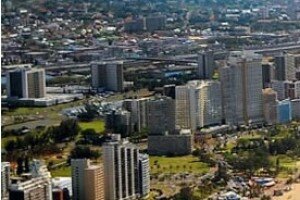
HumanIPO reported yesterday the Opposition to Urban Tolling Alliance (OUTA) doubts SANRAL is ready to implement e-tolling in Gauteng within two months.
In a statement released at a press conference on the socio-economic impact of SANRAL’s proposed tolling in the Western Cape in parliament yesterday, the DA said commuters from both Khayelitsha and Mitchells Plain could pay as much as ZAR1,160 (US$126) a month to travel into Cape Town CBD should the project be implemented.
The DA base their claims on the results of various socio-economic impact studies.
“Both areas have the lowest income levels and the highest unemployment in the city (45.1 per cent). They are also home to the largest portion of the metro’s population (24.88 per cent),” said Meyer.
Furthermore, Meyer said: “Based on the current tariff at the Hugenot tunnel, a vehicle travelling from Khayelitsha or Mitchells Plain to Cape Town, will have to pay a toll of R58 (US$6.30) per day for a round-trip. This amounts to ZAR290 (US$31.47) per week and ZAR1160 per month.”
Meyer added that e-tolling the N2 will “severely affect” the commuters because the highway is a key link from the two areas to the rest of the Cape Town metropolitan area.
“This will place immense financial strain on these already struggling communities and restrict freedom of movement and opportunity. The municipalities surrounding the City of Cape Town will also be affected,” said Meyer.
The N1 and N2 highways are described by Meyer as crucial for the functioning of the Breede River Valley, Threewaterskloof, Drakenstein and Stellenbosch municipal areas.
Agriculture dominates the economies of the aforementioned municipal areas and both highways serve as the main access routes from the farms to the Cape Town harbour.
“Based on our estimates, a farmer in De Doorns, transporting goods to Cape Town on the N1, will have to pay ZAR744 (US$80.72) in tolls for a round-trip, passing through no less than three toll plazas (Sandhills, Hugenot tunnel and the Old Oak interchange).”
Meyer said SANRAL has not been able to give a credible reason for the planned e-tolls in the province, despite the “immense socio-economic impact”.
“They (SANRAL) have also made no effort so far to consult with the affected communities on what the impact of the roads will have on their day to [day] living.”
The DA said it will oppose the e-tolling in the Western Cape the same way they are opposing e-tolling in Gauteng.
The party has already applied for a court interdict against the e-tolling and DA mayors in the Winelands municipalities have united in opposition to the e-tolls.
The DA said it will announce further campaigns against e-tolling in the Western Cape in the coming days.





















































